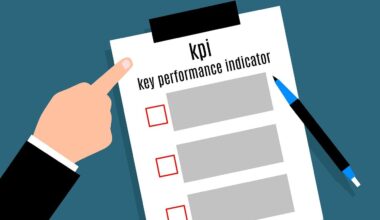Ethical Considerations in Leveraged Investment Strategies
Leveraged investing offers a pathway to potentially higher returns, but it also brings significant ethical considerations that investors must navigate. One important concern pertains to risk management. Investors must be aware that leveraging increases not only potential profits but also exposure to losses. This higher risk profile can lead to situations where investors overextend their financial commitments, exposing themselves and their families to undue financial strain. Responsible leverage means setting clear limits and ethical guidelines regarding how much debt to take on in pursuit of returns. Transparency is crucial in this aspect, as stakeholders deserve to know the risks associated with leveraging. Moreover, ethical investing requires considering the broader impact of financial decisions on communities and the environment. As such, leveraged investors should seek strategies that align with sustainable practices. Engaging with regulations governing leveraged investing is critical to maintain ethical standards and ensure compliance with financial laws. Integrating ethical considerations into leveraged approaches may include prioritizing companies with sound environmental, social, and governance policies. Incorporating these principles can result in safer investment environments, aligning financial goals with ethical imperatives.
Evaluating opportunities for leveraged investments involves assessing the moral implications tied to the sectors chosen for investment. Investors must ensure that their leverage does not disproportionately benefit the few at the expense of the many. This consideration emphasizes the importance of investing in companies that demonstrate a commitment to ethical standards. On a practical level, this may involve conducting due diligence on companies to gauge their practices and policies concerning labor rights, environmental responsibility, and social equity. When investing with leverage, understanding the consequences of supporting certain industries, such as fossil fuels or tobacco, is essential. Such sectors may yield high returns but often come with ethical baggage, producing harmful societal effects. Individuals interested in a leveraged investment strategy must weigh potential profits against ethical considerations. By establishing firm ethical guidelines, investors can make informed decisions that reflect their values. This alignment is crucial, as it avoids conflicts with personal ethics. Additionally, ethical guidelines can mitigate reputational risks associated with leveraged investments and further enhance portfolio integrity. Investors looking to leverage should also actively engage with communities affected by their investments, ensuring that outcomes benefit a wider audience.
Leveraged Investing and Social Responsibility
In an increasingly interconnected world, leveraged investment strategies should take into account the concept of social responsibility. Investors must recognize that the actions they take can materially impact the communities in which the companies operate. This principle entails careful evaluation of how leverage is used, ensuring that it does not contribute to detrimental business practices, such as exploiting labor or harming the environment. The challenge lies in striking a balance between achieving financial success and making socially responsible choices. A company that engages in unethical practices, even if it promises high returns, makes leveraging a heavier moral burden. Investors must consider the long-term repercussions of their investments. Beyond potential short-term gains, assessing how leveraged strategies align with societal needs is essential. Investors may benefit from engaging with frameworks such as the United Nations Sustainable Development Goals, which provides a structured approach to responsibility. Implementing ethical frameworks helps guide leveraged investment decisions that are not only profitable but also socially beneficial. In this way, investors can play a significant role in fostering sustainable development while pursuing their financial interests.
Financial literacy is an essential component of responsible leveraged investing, providing individuals with the necessary tools to navigate complex financial landscapes. Investors must understand the mechanics of debt and leverage, as ignorance can lead to significant financial pitfalls. Engaging in educational opportunities, such as workshops or reading material focused on ethical considerations, empowers investors to make more informed choices. Ethical investing education can augment understanding of the potential consequences of leveraging debts and the social implications of these choices. Additionally, investors should have access to resources that outline best practices for ethical leveraging. Such resources can foster a community of practiced investors who share insights, helping to elevate individual and collective understanding. Networking with others who prioritize ethics can create a supportive environment where discussions around responsible leveraging thrive. Financial institutions also play a role in promoting literacy by providing transparent information about potential risks and rewards associated with leveraged investment products. By prioritizing transparency, they can cultivate trust and ensure investors are well-equipped to make sound decisions. This shared knowledge lays the groundwork for a more ethical investment landscape.
Risk Awareness in Leveraged Investments
Risk awareness plays a critical role in enhancing ethical considerations for leveraged investment strategies. Investors need to identify, assess, and manage the risks associated with leveraging before committing resources. A strong understanding of the types of risks involved—including market fluctuations, interest rate changes, and economic downturns—is vital for making informed decisions. Ethical investing also requires recognizing the potential implications of increased indebtedness for individuals and their families. Leveraging can seem attractive when returns are promising; however, the associated risks can lead to devastating consequences if not properly managed. Establishing risk tolerance levels that align with personal values encourages responsible investing behaviors. Investors should consider developing robust risk assessment frameworks that evaluate prospective investments within an ethical context. Furthermore, these frameworks can guide decisions about which types of leverage are acceptable. Comprehensive risk analysis not only considers potential financial losses but also examines the societal effects of leveraging decisions. By cultivating risk awareness, investors can build strategies that reflect their commitment to ethical practices while pursuing financial growth. This dual approach ensures that ethical principles and investment objectives coexist harmoniously.
Investor activism serves as another pathway to promote ethical considerations in leveraged investing. Engaging in shareholder advocacy allows investors to influence company policies, pushing for changes that prioritize sustainability and ethical business practices. Through leveraging their financial power, investors can signal strong preferences for responsible corporate behavior. Mobilizing collective investment actions can amplify this influence, particularly when investors unite around shared ethical values. Campaigning for transparency concerning how leverage is utilized within companies can help enhance accountability and foster social responsibility. Activism may involve filing shareholder resolutions or engaging in direct dialogue with management, striving to align company strategies with ethical principles. Although leveraged investments involve financial risks, activism can drive positive changes within the companies, mitigating potential adverse effects that arise from leveraged structures. Supporting companies that embrace ethical principles through active involvement also encourages other investors to reconsider leveraged strategies. This collaborative effort can reshape the investment landscape over time, fostering a business environment where ethical considerations stand at the forefront of leveraged investing. Ultimately, activist investors play a vital role in advancing ethical standards across industries.
Conclusion: The Future of Ethical Leveraged Investments
Looking forward, the future of leveraged investing will heavily depend on how ethical considerations evolve within the financial sector. Recognizing the consequences of leveraging and fostering a culture of accountability is crucial for sustainability within markets. The growing demand for socially responsible investments clearly reflects a significant shift in investor expectations. Investors are increasingly seeking opportunities to contribute positively to society while also achieving financial success. This new paradigm underscores the need for enhanced guidelines regulating leveraged investments to support ethical practices. Regulatory measures can help protect both investors and the broader community from the potential hazards that accompany aggressive leveraging. As societal values continue to influence investment decisions, embracing ethical practices can give companies a competitive advantage. Financial institutions must adapt to these changing expectations by offering products that prioritize social responsibility. Leveraged investing strategies that integrate ethical considerations are essential for fostering an environment in which financial growth does not come at the expense of societal well-being. By committing to responsible leveraging, investors can help shape a future where financial success and ethical integrity coexist harmoniously, creating sustainable growth.
Understanding ethical considerations in leveraged investment strategies is key to fostering a more responsible financial landscape. As investors embrace leveraged approaches, prioritizing ethical practices ensures that the pursuit of wealth aligns with broader societal values. Adopting ethical frameworks will empower investors to navigate the financial ecosystem with greater accountability. In doing so, they will promote both financial growth and social sustainability. Strategies that intertwine ethical thinking with leveraged methods can revolutionize investment practices, ensuring that profitability caters to collective well-being. Engaging in transparent communication about the implications of leveraging benefits not only individuals but also society as a whole. The dialogue around ethical leveraged investing must continue to evolve as societal priorities change. Recognizing the need to balance financial innovation with ethical imperatives will shape the future of investing. Leveraged investing can serve as a force for good when coupled with ethical considerations, driving progress across industries. The financial world is shifting towards an ethos where investors champion ethical standards alongside their financial ambitions. As this shift continues to gain momentum, it becomes clear that leveraging in harmony with ethics paves the way for sustainable investment strategies.


